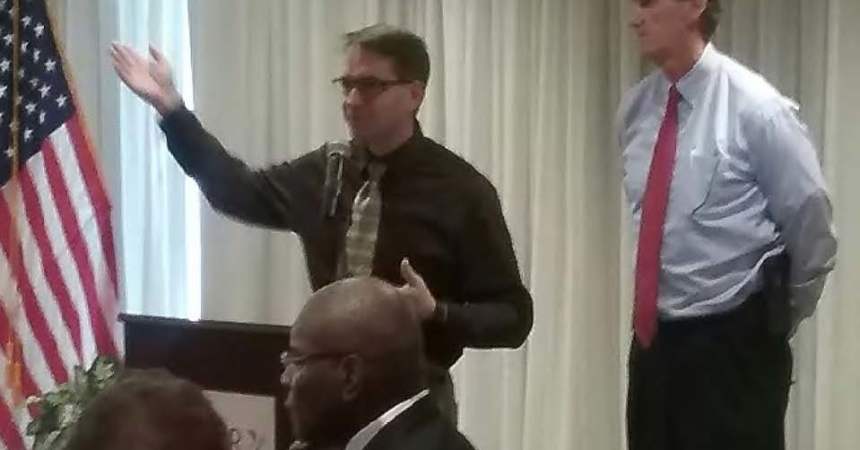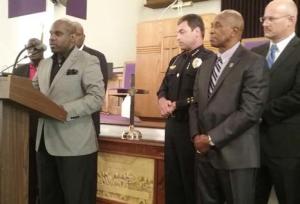
Clergy wants to start talks with TPD

Tallahassee police chief Michael DeLeo and Rev. Lee Johnson listen to pastor Rudy Ferguson during Friday’s press conference.
By St. Clair Murraine
Outlook writer
With the chief of Tallahassee Police Department standing at their side, a group of clergy called for the start of conversations between law enforcement and the community in the wake of police-involved shootings in Louisiana and Minnesota.
An apparent retaliation took the lives of five police officers in Dallas within days after the shooting of two Black men. That, the group of ministers said during a Friday press conference, is reason to be concerned about the relationship between police and the people they are supposed to protect.
Rev. Lee Johnson, pastor at Trinity United Presbyterian Church, unequivocally said that racism is the reason for the shootings. He spoke during a hurriedly organized press conference at Bethel Missionary Baptist, where Rev. R.B. Holmes is pastor.
“We know that no law has been able to destroy racism,” a stoic Johnson said. “No rule has ever been able to destroy racism. No policies or procedure has ever been able to destroy racism. At the bottom of all of these shootings, is racism. I think it’s time we call it like it is.”
The days of shooting started when Alton Sterling was fatally shot by police in Baton Rouge, La., last week. A day later in Falcon Heights, Minn. Philando Castile was killed in a police shooting that was recorded on video by his fiancé Diamond Reynolds.
In what seemed to be retaliation two days later, Micah Xavier Johnson shot and killed five police officers in Dallas, while wounding several others.
The incidents spurred protests across the country. Clashes between police and protesters have been reported over the weekend, with many of the protesters arrested.
Black Lives Matter activist DeRay Mckesson was arrested during protest in Baton Rouge. He is one of the organizations loudest voices.
Johnson said when the conversation begins with law enforcement, participants have to put everything on the table. He insisted that’s the only way progress will be made.
“If we haven’t been showing that we need each other, then God help us,” he said. “We’ve got to get honest and move on with the rest of our lives.”
TPD chief Michael DeLeo agreed.
“We have to continue to commit to working together; constant dialog with the criminal justice system,” he said.
As concern over how police are prepared for a stressful job grows as part of the national narrative, DeLeo said TPD takes every measure to screen who it entrust with public safety. He gave a case of TPD’s recent hiring of 20 officers out of a field of 35 applicants.
He added that a psychiatric evaluation is routine for new officers.
“We don’t want to hire someone just to hire them,” he said. “They have to be a good fit; they have to have the right background and judgment.”
As if to get the conversation started, Rev. Joseph Wright put several suggestions for bridging the gap with law enforcement on the table. Finding a way to make sure police officers undergo sensitivity training will be a good starting point, he said.
Wright also called for an oversight board to keep tabs on police interaction with the community.
“We need stronger police and community oversight boards, I believe,” he said. “Law enforcement can’t police themselves.”







